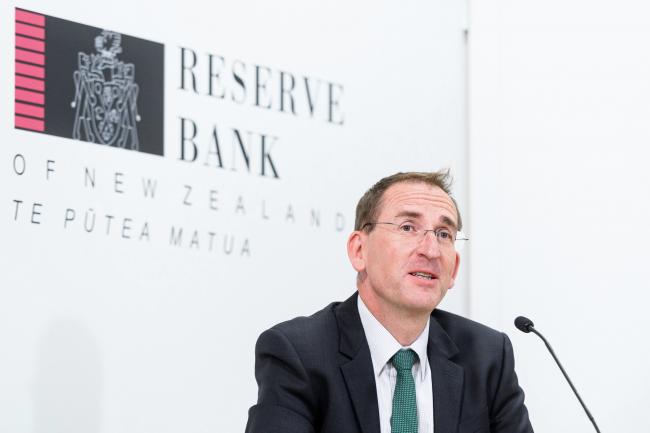(Bloomberg) -- New Zealand’s central bank said it’s prepared to engage in large-scale asset purchases if it needs to in a major financial crisis, meaning it would effectively print money to keep the economy afloat.
The Reserve Bank would turn to five policy tools to battle a massive economic shock including so-called quantitative easing, Assistant Governor John McDermott said in an interview Wednesday. He spoke after the bank published a research paper setting out the unconventional monetary policy responses it could employ should a major shock threaten the economy.
Unlike central banks in Europe, Japan and the U.S., the RBNZ came through the global financial crisis without having to use unconventional policies. However, in the wake of the crisis, inflation has remained low around the globe and central banks have so far been unable to raise interest rates back to where they were, leaving them less conventional firepower should another shock hit. The RBNZ’s official cash rate is still at a record-low 1.75 percent.
“This is all about planning for the future,” McDermott said. While there’s “no imminent prospect” of using such measures, “the probability of needing them at this point in the cycle is higher than it ever was in history” and “it would be silly of us not to be ready just in case.”
The RBNZ has studied the unconventional policies used by central banks abroad to determine which ones would be appropriate for New Zealand, McDermott said. Their use would require a very large shock to the economy, “like another GFC or a bigger Asian financial crisis embodying China, something that really has a big impact,” he added.
The RBNZ’s Five Unconventional Policies
Taking the OCR into negative territory would lower longer-term rates and also encourage banks to lend, because it would cost them to park excess cash with the RBNZ.
McDermott said overseas experience showed that the lower limit for a policy rate was probably around minus 0.75 percent, though he indicated a likely level for the OCR would be around minus 0.5 percent. It could be detrimental to leave rates negative for too long, he said.
Forward guidance is something the RBNZ is “well practiced at,” but it would need to back up its commitments with asset purchases. Government and corporate bonds could be purchased but the amounts would be limited by the relatively small size of New Zealand’s markets. The RBNZ could therefore look to purchase foreign government bonds with the intent of weakening the kiwi dollar.
“The quantity of assets we could purchase is relatively unlimited, but the potential balance sheet risk we’d be taking on would be phenomenal,” McDermott said. “We leave that as an open question. It’s probably something the bank wouldn’t do without support from the government.”
Swaps, Loans
The bank could purchase interest-rate swaps to influence broader interest rates, something McDermott said has not been tried overseas. He said New Zealand’s interest-rate swaps market was relatively large and liquid, so the bank may not face the same constraints it would with bond purchases.
“We have no experience from overseas to see how it would work, but it looks more appropriate for New Zealand,” he said.
The final option was to offer banks long-term loans against collateral to ensure they have access to funds when overseas sources may be drying up.
McDermott said circumstances would dictate which tools the RBNZ used. A mix of measures could be employed and the OCR would not have to fall to zero before other policies were implemented.
The aim would be to lower borrowing costs across the yield curve and to convince markets that the RBNZ had ample firepower to protect New Zealand’s economy, he said. While the bank didn’t need the government’s approval for any of the measures, coordination with it would be desirable.
“If we felt this was necessary to protect New Zealand, we can do any of this, but the more we’re supported by the government, the more effective this would be,” McDermott said. “Maybe the government would give us more capital or indemnify us against any risk of losses we’d take on, or maybe they would just do more fiscal policy. In that kind of world, I think coordination would be important.”
